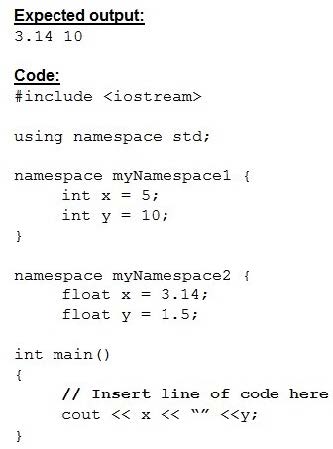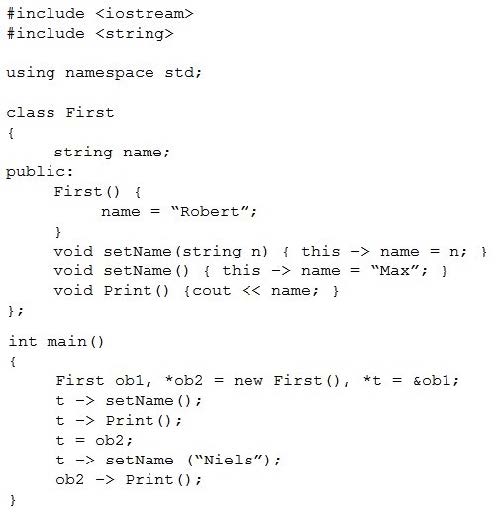Exam Details
Exam Code
:CPA-21-02Exam Name
:CPA - C++ Certified Associate ProgrammerCertification
:C++ Institute CertificationsVendor
:C++ InstituteTotal Questions
:257 Q&AsLast Updated
:Jul 18, 2025
C++ Institute C++ Institute Certifications CPA-21-02 Questions & Answers
-
Question 181:
What happens when you attempt to compile and run the following code?
#include
using namespace std;
int main()
{
int i = 5;
do {
i??;
cout<
}
while(i >= 0);
return 0;
}
A. It prints: 43210?1
B. It prints: ?1
C. It prints: 4321
D. It prints: 1
-
Question 182:
What happens when you attempt to compile and run the following code?
#include
#include
using namespace std;
class SampleClass
{
string *s;
public:
SampleClass() { s = new string("Text");}
SampleClass(string s) { this?>s = new string(s);}
~SampleClass() { delete s;}
void Print(){ cout<<*s;}
};
int main()
{
SampleClass *obj;
obj = new SampleClass("Test");
obj?>Print();
}
A. It prints: Text
B. It prints: Test
C. It prints: TextTest
D. Garbage value.
-
Question 183:
What happens when you attempt to compile and run the following code?
#include
using namespace std;
int main()
{
long int x,y=10;
double d;
d = 3.99;
x=(int) d;
cout << x <<", ";
d=float (y);
cout << d;
return 0;
}
A. It prints: 3, 10
B. It prints: 3.99, 10
C. It prints: 4, 10.0
D. It prints: 4, 10
-
Question 184:
What happens when you attempt to compile and run the following code?
#include
#include
using namespace std;
void fun(int i);
int main()
{
int i=0;
i++;
for (i=0; i<=5; i++)
{
fun(i);
}
return 0;
}
void fun(int i)
{
if (i==3)
return;
cout << i;
}
A. It prints: 05
B. It prints: 012345
C. It prints: 01245
D. It prints: 0
-
Question 185:
What happens when you attempt to compile and run the following code?
#include
using namespace std;
class Base {
int age;
public:
class C {
int b;
void PrintC() { cout << b; }
};
Base () {age=5;};
void setAge(int a=20) {age = a;}
void Print() { cout << age;}
};
int main () {
Base a;
a.setAge(10);
a.Print();
return 0;
}
A. It prints: 1020
B. It prints: 105
C. It prints: 10
D. It prints: 20
-
Question 186:
Which code line inserted instead of the comment below will cause the program to produce the expected output?

A. using namespace myNamespace1; using namespace myNamespace2;
B. using namespace myNamespace1;
C. using namespace myNamespace1::y; using myNamespace2::x;
D. using namespace myNamespace2::y; using myNamespace1::x;
-
Question 187:
What happens if characters 'w', 'o', 'r', 'l' and 'd' are entered as input?
#include
#include
using namespace std;
int main()
{
string s1 = "Hello";
string s2;
getline( cin, s2 );
cout << s1 + s2;
return( 0 );
}
A. It prints: Helloworld
B. It prints: Hello
C. It prints: world
D. Compilation error
-
Question 188:
What happens when you attempt to compile and run the following code?
#include
using namespace std;
class First
{
public:
First() { cout << "Constructor";}
~First() { cout << "Destructor";}
void Print(){ cout<<"from First";}
};
int main()
{
First FirstObject;
FirstObject.Print();
}
A. It prints: Constructorfrom First
B. It prints: Constructorfrom FirstDestructor
C. It prints: Constructorfrom FirstDestructorDestructor
D. Compilation error at line 16
-
Question 189:
What is the output of the program given below?
#include
using namespace std;
int main (int argc, const char * argv[])
{
float f=?10.501;
cout<<(int)f;
}
A. 0
B. 11
C. ?10
D. ?11
-
Question 190:
What happens when you attempt to compile and run the following code?

A. It prints: MaxNiels
B. It prints: RobertMax
C. It prints: RobertNiels
D. It causes a compilation error
Tips on How to Prepare for the Exams
Nowadays, the certification exams become more and more important and required by more and more enterprises when applying for a job. But how to prepare for the exam effectively? How to prepare for the exam in a short time with less efforts? How to get a ideal result and how to find the most reliable resources? Here on Vcedump.com, you will find all the answers. Vcedump.com provide not only C++ Institute exam questions, answers and explanations but also complete assistance on your exam preparation and certification application. If you are confused on your CPA-21-02 exam preparations and C++ Institute certification application, do not hesitate to visit our Vcedump.com to find your solutions here.